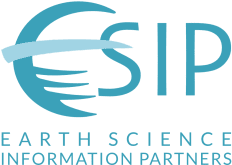2 Jul 2024 | Member Highlights

PANGAEA – Data Publisher for Earth and Environmental Science is a joint facility of the Alfred Wegener Institute Helmholtz Centre for Polar and Marine Research (AWI) and the Centre for Marine Environmental Sciences (MARUM) at the University of Bremen. Essential services provided by PANGAEA are scientific project data management, long-term data archiving, data publication, and dissemination of metadata according to international standards and protocols.PANGAEA focuses on georeferenced observational and experimental data. Citability, comprehensive metadata descriptions, interoperability of data and metadata, a high degree of structural and semantic harmonization of the data inventory as well as the commitment of the hosting institutions ensures FAIRness of archived data.
The repository was recently recertified with CTS and has been a WDS regular member since June 2013.
2 Jul 2024 | Member Highlights

Earth Science Information Partners (ESIP) is a nonprofit organization that provides a neutral space for exciting cross-domain collaborations. Created by NASA in 1998, ESIP was formed in response to a National Research Council recommendation calling for the involvement of community stakeholders in the development of NASA’s Earth Observing System Data and Information System (EOSDIS) as a critical element of the U.S. Global Change Research Program. They are an open-networked community that brings together science, data, and information technology practitioners. The ESIP community includes 170+ Partner organizations and individual volunteers who come together to share, expand, and innovate across environmental science disciplines. ESIP has been a WDS partner member since April 2016.
WDS-IPO and WDS-ITO will attend the July ESIP Meeting in Asheville, North Carolina, United States. If you are attending, stop by and say hello! This will be a great event to build connections.
5 Jun 2024 | Member Highlights

The International Laser Ranging Service (ILRS) provides global satellite and lunar laser ranging data and their related products to support geodetic and geophysical research activities. The aim of these activities is primarily focused on geodetic and geophysical parameter estimation and geophysical model development. Furthermore, the main thrust of these activities addresses the needs of the International Earth Rotation and Reference Systems Service (IERS) with products that contribute to the development of an ever more accurate International Terrestrial Reference Frame (ITRF).
The unique ability of ILRS to sense the Earth System center of mass with high accuracy makes these products invaluable in the development of the ITRF, the prime product is the Global Geodetic Observing System (GGOS). The service coordinates operations of a global laser ranging network, develops the necessary global standards/specifications, and encourages international adherence to its conventions ensuring the highest quality of results. The ILRS is one of the space geodetic services of the International Association of Geodesy (IAG). The ILRS data and products are collected and generated under strict standards and they contribute to a wide range of scientific, engineering, and operational applications and experimentation.
The ILRS has been a WDS network member since 2013.
5 Jun 2024 | Member Highlights

The Center for Socio-Political Data (CDSP) is one of France’s major centers for the production and handling of social science data. It is a key player in the documentation, preservation and production of data. It is also a center of expertise on quantitative and qualitative methods, associated with European research infrastructures. A support and research unit (UAR 828) set up in 2005 by Sciences Po and the CNRS, CDSP is sustained by a team of more than 20 developers, engineers and data specialists.
CDSP is developing a range of infrastructures, platforms and services aimed at the academic community and fully engaged with an open science approach. In this capacity, CDSP provides expertise relating to probability panels and online surveys, metadata standards, and the development and implementation of application infrastructures for research. As such, CSDP is an actor for the promotion and the implementation of open science principles in the SSH community in France and Europe.
CDSP’s databank received CTS certification in August 2023, and they have been a WDS regular member since December 2023.
1 May 2024 | Member Highlights

The China National GeneBank DataBase (CNGBdb) has recently joined the World Data System as a Regular Member. CNGBdb is a unified platform built for biological big data sharing and application services to the research community. Based on the big data and cloud computing technologies, it provides data services such as archive, analysis, knowledge search, management authorization, and visualization. At present, CNGBdb has integrated large amounts of internal and external molecular data and other information from CNGB, NCBI, EBI, DDBJ, etc., indexed by search, covering 10 data structures. Moreover, CNGBdb correlates living sources, biological samples and bioinformatic data to realize the traceability of comprehensive data.
China National GeneBank DataBase is one of the key science infrastructures in Shenzhen, approved and funded by the Chinese government. CNGBdb is committed to supporting public welfare, life science research, innovation and industry development, through effective bioresource conservation, digitalization and utilization.
The China National GeneBank DataBase is a public, non-profit, open, and enabling platform. It facilitates advanced genomics R&D and technology transfer to industrial application, including precision medicine, agriculture, marine sciences and microbial application, towards its mission of making genetic resources “Owned by All, Completed by All and Shared by All”.
1 May 2024 | Member Highlights

The Korea Institute of Science and Technology (KISTI) joined as an Associate Member in September 2013, attained CoreTrustSeal certification March 2024 and just moved to Regular Member. KISTI is a government-funded research institute in South Korea established in 1962 and contributes to the promotion of national science and technology, industrial development, and national welfare by establishing R&D and service system of science and technology infrastructure.
As a leading national institute of science and technology information, KISTI’s mission states development and support of core science and technology information resources and knowledge infrastructure and create an open, shared-data ecosystem, contributing to the innovative growth of Korea and the quality of citizen’s lives.






